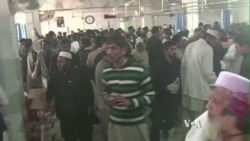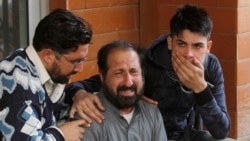Pakistani officials are taking steps to respond to Tuesday's Taliban assault on a school in Peshawar while the nation begins three days of mourning for the 132 children and nine staff members who died.
Prime Minister Nawaz Sharif approved an order Wednesday lifting a moratorium on the death penalty in terror cases that had been in place since 2008.
Sharif has also pledged to continue a military offensive against militants in the country's northwestern tribal region, near the Afghan border.
The Pakistani Taliban said it carried out Tuesday's attack in retaliation for the army's push to go after the insurgents.
Meanwhile, Pakistan's army chief visited Kabul on Wednesday for talks with Afghan President Ashraf Ghani on the security situation along their countries' border.
Ghani assured Pakistani General Raheel Sharif that militants would not be able to use Afghan soil to launch terrorist attacks against Pakistan and that any sign of this would be eliminated.
Sharif, who was accompanied by the head of Pakistan's intelligence agency, Rizwan Akhtar, met separately in Kabul with U.S. General John Campbell, who heads NATO forces in Afghanistan.
Critical intelligence was shared during both meetings with regard to Tuesday's Taliban assault on the Peshawar school.
VOA's Ayaz Gul said Wednesday's visit by the Pakistani officials was unprecedented and could be a good sign in relations between Pakistan and Afghanistan. Friction between the two countries had eased because of Ghani's recent visit to Islamabad, which "left behind a very good atmosphere to help both the countries reduce tensions," Gul said. But such improvement may not endure "if there is no cooperation ... on how to deal with these kinds of terrorist forces."
Pakistani Taliban fighters have long used the North Waziristan region to provide refuge for Afghan insurgents who cross over the porous border.
Former Afghan President Hamid Karzai also often accused the Pakistani military of supporting the Taliban in Afghanistan, which Pakistan denies.
World condemnation
Tuesday's attack brought condemnation from the world, including from the U.N. Security Council, which labeled it a "depraved and savage" act of terror against children.
U.N. Secretary-General Ban Ki-moon said the militants showed cowardice, and that "no cause can justify such brutality."
U.S. Secretary of State John Kerry expressed condolences in a phone call to Sharif, saying the United States stood in solidarity with Pakistan in the fight against terror.
Authorities said the attack began when seven militants, carrying ammunition and explosives, used a ladder to scale a back wall at the school, which houses more than 1,000 students and staff. When they reached a student assembly in a packed auditorium, they opened fire.
From there, witnesses said, the attackers went from classroom to classroom, methodically killing everyone they could reach. The militants also wounded another 121 children and three staff members.
MIlitary spokesman Major General Asim Bajwa said all of the attackers were killed in hours-long gunbattles with Pakistani troops, who swarmed the facility.







